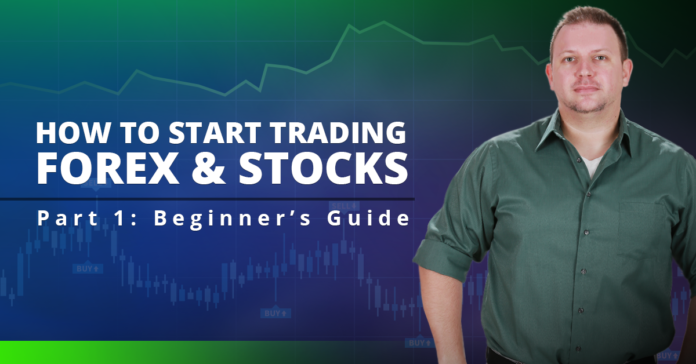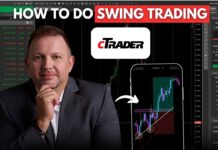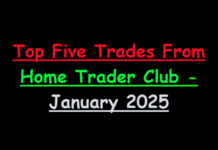
Have you ever wondered where and how to start trading forex & stocks ? I bet that many people who have never been involved in the financial markets, seen movies or read books about it and got curious. What is trading? How to get involved? How to buy stocks?
In this article I will try to answer these questions and give you the basic idea of where to start if you want to dip into the financial pool.
What is trading?
Exchanging one thing for another. These two things could be literally anything in the world. You might be exchanging money for food. You might be exchanging one car for another…In the financial markets you will be exchanging money for a financial instrument (stocks for example). In other words you buy stocks or bonds. If you expect that the value of a given company will rise you purchase some of the stocks of this company, and when the price increases you make money. This is it! This is what traders do.
If you think about it you have been a trader your whole life. Every day you are “trading”. In the super market, in the coffeehouse etc. Now let’s take a look of what the forex market is.
What is the Forex market?
As explained in the video above the forex market is the biggest financial market in the world. It is a market where currencies are traded. Trillions of dollars and other currencies are being exchanged on daily basis.
Parties involved are banks, governments, businesses, investors and others. We (me, you and your uncle George) fall into the category of investors. We are called home traders or retail traders.
For example a computer manufacturer based in the US, works with a company in Asia that assembles their hardware. The US company will pay in USD (us dollars) but the Asian company will convert the US Dollars to their local currency.
Another example is John from US is going on a holiday to Germany. Since the local currency in Germany is euros, John goes to a bank before his trip to exchange some money. He buys Euros. In other words he is trading. Selling dollars to buy euros.
The currencies in the forex market are traded in pairs (EURUSD, USDJPY etc) as one whole.
Here is an example of what investors do on the market, aiming to make profits from the price changes. If investor X believes that the Euro will depreciate against the Dollar he would sell the EURUSD pair.
Say that the current rate is 1/1.12 – in other words 1 euro = 1.12 us dollars. So in that case if investor X is selling he believes that 1 euro will be traded for less dollars 1.11 or even 1.10 based on his analysis. If that happens investor X will make money. If the opposite happens investor X will lose money.
Basically a trader makes money when he buys a currency which price increases afterwards and sells a currency which price decreases afterwards.
Another important feature in the forex market is the ability to use Leverage. Leverage is basically borrowing money from your broker. You will be in control of significantly larger amount of money. This is great because you will be able to earn a lot more compared to your investment. However if you don’t apply good risk-management you may also lose a lot more.
Example of leverage – you deposit $100 dollars with leverage of 1:10. In this case you will be in control of $1000 dollars (10x$100).
It is important to understand that as forex is the larget financial market in the world it has a huge influence on other markets such as commodities, interest rates, stocks etc… There is correlation between them and any significant move on the forex market will influence some of the other markets.
Arm yourself with knowledge before you start
Before you start trading with your savings you MUST put time and effort to learn. It may seems as a piece of cake Buy or Sell and you make money but it is not.Even though the chances of price going up or down are 50/50 more of 95% of the traders fail to make money in the long run.
Trading is like any other profession. Take it seriously. Respect it. Just because you can do it part time literally anywhere in the world as long as you have internet and computer at your disposal it doesn’t mean it is an easy task.
If you were a doctor who should do a surgery, would you go for it after just a few hours of learning? It takes time, discipline, consistency and a lot of hard work to get to the place of which you are dreaming right now.
Internet is full of scams and non sense educational materials. This is probably one of the hardest pieces of the puzzle to solve. Finding a good, quality educational materials. Do your home and research. Stick to names that have been around and proved to work.
Set clear goals before you start trading forex & stocks
Before you start trading and getting into it, set clear goals and mile stones. It is a long and hard process so you better break it down into smaller pieces. Go step by step. Learn, practice, master, move forward. Don’t try to learn material that people spend years on learning, in just two weeks.
Go slow and try to understand everything you are learning. Market is not going anywhere. Your money on the other side could vanish very fast if you fast forward you education.
Having set clear goals that you follow will also help you psychologically. You can see you progress and this progress will be measurable. You can always go back and test yourself on something you studied a few weeks ago.
Brokers
To be involved in the financial market as a retail (home) trader you need a middle man. The middle man is usually your broker. This is where it gets dirty. Due to the nature of the business many brokers would try to rip off their clients. They have their own little tricks up their sleeves. I highly recommend you to dig deeper on this subject. Go with a broker who have been on the market for many many years and have sustained through financial storms.
Go with the big names. If they have been around for years, there is a reason for that. Make sure to check the Friendly Brokers list.
Set risk per day/week/month before you start trading forex & stocks
Assuming that you have some basic knowledge and you have made your choice for a broker you should define your risk. You risk-management is CRUCIAL part of your trading plan. The most important if you will. I can’t stress this one enough.
Think about it this way. If you know how to protect your money, even though you don’t know how to make money yet, worst thing that should theoretically happen is NOT losing money, neither make any more. In other words learn how not to lose before you actually make money.
A great way to start is by setting a defined risk per day, week and month. Once you reach your limit for the given period stop trading. It is extremely helpful psychologically.
For example you have a weekly limit of 5% loss. If you have reached that limit on Tuesday, stop trading for this week. Come back next week, refreshed, full of energy and take it from there. No need to push it.
What does trading require?
Many would argue that you are either born a trader or you are not. You either have it or you don’t. I’m not one to say that as I don’t believe it. I think anybody could become a successful trader as long as he or she do it right, with the right people. There is not formula that would fit for all but i think the basics are the same for all people and could be applied to any individual with slight differences.
- Patience. I’m starting with this one on purpose. One of the most common mistakes is trading because you are bored, closing positions too early as you don’t have the patience to wait etc… Patience is a huge factor that influences all corners of this business.
- Consistency. Doing the right thing, taking the right decision ALL the time could be extremely difficult. Losing is part of the game but you must learn to trade right. There are many factors that will lure you into trades you shouldn’t be in. Don’t worry too much though, anything could be learned as long as you set it as a goal.
- Focus. Traders should have good focus. You will have to analyze factors that can influence the outcome of your trade. You will be following a trading plan but in order to execute it good, you must be focused. Cooking dinner, cleaning your garage, reading emails, watching the game and trading all at the same time may not be a good idea.
- Initial Investment. Aside from some of the qualities I believe every trader should work on to improve, trading will also require money to trade. I highly recommend you NOT to use money that you can’t afford to lose. Don’t trade with your rent/mortgage money or your kids college tuition fund. Trading virtual money (demo account) and live money (real account) is different. Another tip is to smart small. If you have saved up $10,000 start with $1000 or $2000. Let the whole idea of winning and losing settle down in your head. Work on your emotions. First time you open a real trade with will be crazy. You will be watching the numbers going up and down and it is very likely that you will detour from the trading plan. Until you are absolutely sure that you are strict and profitable stick to a demo account, then start with a small live account, and only then deposit the big money.
That would be all for this post. Stay tuned for part II.
If you want to share your feedback on this article please do so in the comment section below!
If you like it, share it!
Yours,
Vladimir























